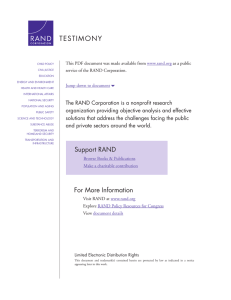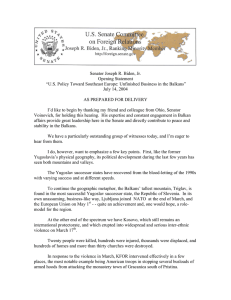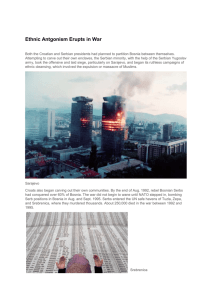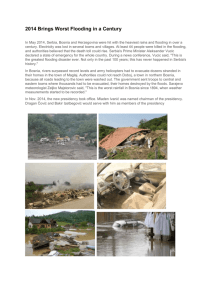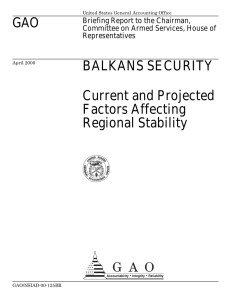US Policy toward Southeast Europe: Unfinished Business in the
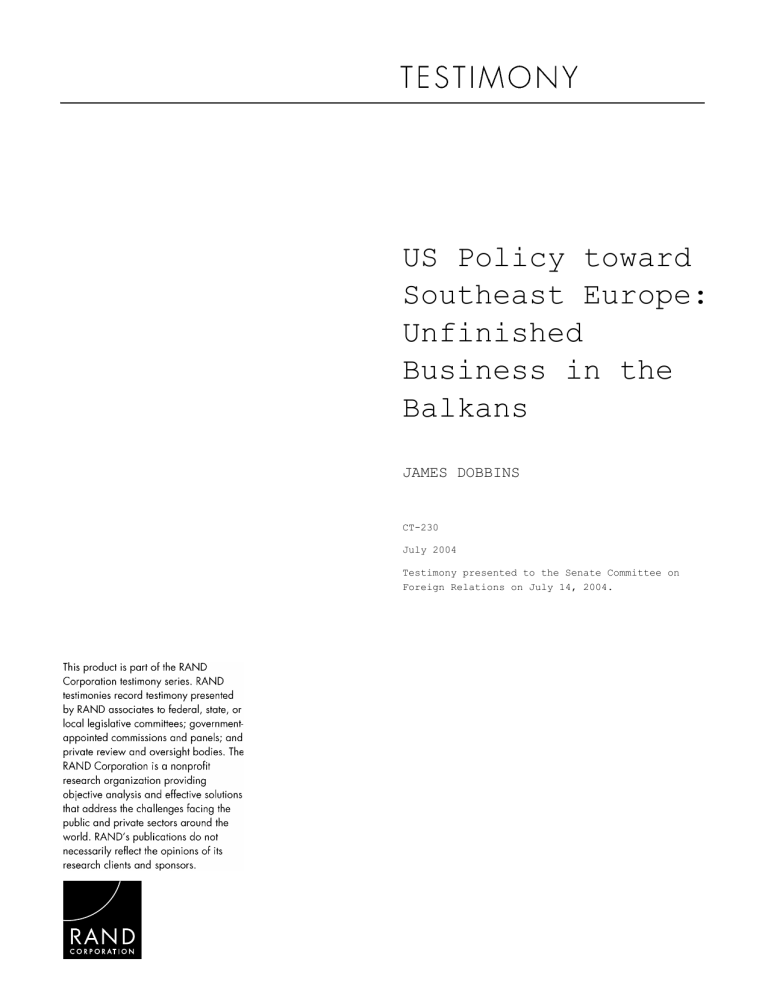
US Policy toward
Southeast Europe:
Unfinished
Business in the
Balkans
JAMES DOBBINS
CT-230
July 2004
Testimony presented to the Senate Committee on
Foreign Relations on July 14, 2004.
Published 2004 by the RAND Corporation
1700 Main Street, P.O. Box 2138, Santa Monica, CA 90407-2138
1200 South Hayes Street, Arlington, VA 22202-5050
201 North Craig Street, Suite 202, Pittsburgh, PA 15213-1516
RAND URL: http://www.rand.org/
To order RAND documents or to obtain additional information, contact
Distribution Services: Telephone: (310) 451-7002;
Fax: (310) 451-6915; Email: order@rand.org
1
Director of RAND International Security and Defense Policy Center
Before the Committee on Foreign Relations
United States Senate
July 14, 2004
I appreciate the Committee’s invitation to testify on a set of issues that has been overshadowed of late by more dramatic and alarming developments elsewhere in the world. Even as we cope with new challenges, however, it is important to preserve the gains made over the past decade in bringing peace and democracy to the Balkans.
American policy toward this region has been marked by a high degree of continuity.
Having helped shape the policies in the last Administration, and helped persuade the current Administration to take these up, I naturally remain supportive of the main lines of
Administration policy in the region. Rather than review each of the questions the
Committee staff has posed to the panel for this hearing, therefore, I will confine myself to comment on three issues, first, the process for determining the final status of Kosovo, second, the withdrawal of American troops from Bosnia, and third, the balance to be struck between the pursuit of justice and reconciliation in the region.
Final Status of Kosovo
In the aftermath of recent ethnic violence in Kosovo, many have asked why, after nearly five years of peace, reconciliation between the two major ethnic communities has not advanced further. I believe the answer is fairly simple. They do not know to what future they should become reconciled. Serbs and Albanians in Kosovo are unlikely to reconcile with each other until they share a common expectation regarding Kosovo’s future – not a common goal or a common desire, that is too much to ask – but a common expectation around which to organize their relations with each other.
In 1999, as the Kosovo air war came to an end, the United States agreed to defer any decision regarding Kosovo’s final status. Those of us who participated in these policy considerations came to this conclusion not because we thought such a postponement good for Kosovo, but because we thought it good for the region. We understood well enough that prolonged uncertainty regarding Kosovo’s final status was likely to exacerbate ethnic tensions there, making Serb residents less likely to accommodate themselves to their new
∗
The opinions and conclusions expressed in this testimony are the author’s alone and should not be interpreted as representing those of RAND or any of the sponsors of its research. This product is part of the
RAND Corporation testimony series. RAND testimonies record testimony presented by RAND associates to federal, state, or local legislative committees; government-appointed commissions and panels; and private review and oversight bodies. The RAND Corporation is a nonprofit research organization providing objective analysis and effective solutions that address the challenges facing the public and private sectors around the world. RAND’s publications do not necessarily reflect the opinions of its research clients and sponsors.
2
minority status and Albanian residents more likely to regard remaining Serbs as potential instruments of revanchis t Serb aspirations. And so it has proved.
Recognizing these drawbacks, the United States nevertheless joined with the rest of the international community to put a decision on Kosovo’s status on hold. It did so out of concern for the stability of the region as a whole, recognizing that a decision to support independence for Kosovo could make it more difficult to hold Macedonia, Bosnia and what was left of Yugoslavia together.
It is now five years on. This trade off between Kosovo and the surrounding region made sense five years ago. It makes less today. Macedonia, Montenegro, Serbia and Macedonia have all had half a decade to adjust to the realities of life after Yugoslavia, to develop closer ties with the European Union and NATO, to overcome internal divisions and settle external disputes.
In the meantime the Kosovo pot has continued to simmer, and, occasionally, to boil over, the heat source being uncertainty over its future. When it does boil over, as happened recently, the international reaction is that this is no time to turn down the heat, for to do so would reward the extremists.
Five years ago, with forty five thousand NATO troops and forty five hundred UN police on their way to Kosovo, and with the great majority that population immensely grateful to the United States and NATO for their liberation, it made sense to give priority to the potentially more volatile situations in Macedonia, Bosnia, Montenegro and Serbia.
Today, by contrast, the most volatile society in the Balkans is probably Kosovo, while
NATO and the UN have less than half the soldiers and police available to keep the lid on than they did a few years ago.
If prolonging Kosovo’s uncertainly unsettles that society, however, opening a prolonged international negotiation on its future could be even more destabilizing, potentially provoking just the sort of ethnic violence the international community is seeking to avoid.
The present bargain on offer to the Kosovars is that first they should meet international standards and then the international community should allow them to open negotiations with Belgrade over their future status. In other words, if the Kosovars behave, they get an invitation back to Ramboullet. Needless to say, this incentive has failed to produce much in the way of performance.
I would propose retaining the sequence of standards before status, but defining both the standards we want, and the status we are prepared to support. With status so defined, the leadership of Kosovo’s majority community would have a greatly enhanced incentive to meet the standards.
This effect might be achieved were the United States and the European Union to jointly announce their willingness to support independence for Kosovo within it current borders provided that Kosovo’s political leaders demonstrate their capacity to build a society in
3
which all Kosovo’s people can live in peace and dignity. The US and EU might further specify their intention to submit a resolution to the UN Security Council two years hence establishing independence for Kosovo providing a reasonable set of standards were met in the interim.
Obviously, there are many permutations such an initiative might take. The essential elements, it seems to me, is that we identify both the status and the standards with the same degree of specificity, and that we set a realistic deadline and achievable set of goals.
I think it unlikely that Russia can be brought to support such an initiative. Neither is
Russia likely, in the end, to block such an outcome. Neither do I think Belgrade likely to embrace such a formula. Nor would we be doing democratic leaders there any favor by pressing them to do so. Unfortunately, agreement between Belgrade and Prestina over
Kosovo’s future status seems as distant today as it was five years ago. Our choice, therefore, is between reinforcing the international troop and police presence and keeping the lid on for another half decade, or moving forward now with the fairest and least destabilizing solution we can devise.
Troop Withdrawals from Bosnia
During his first meeting with the NATO Council Secretary of State Powell pledged to our
European allies that “we all went into Bosnia together, and we will all come out together”. Next year we will come out and they will stay.
The agreement between the European Union and NATO that the former should take over the latter’s peacekeeping duties in Bosnia next year has, nevertheless, a number of advantages. This arrangement frees up American forces for use in Iraq or Afghanistan. It allows the European Union to embark upon its first major peacekeeping operation on familiar terrain. It offers an opportunity to employ and test the arrangements for the EU’s use of NATO planning and command structures so laboriously worked out over the last several years.
On the other hand, the number of American troops being freed up in Bosnia is comparatively small -- a few hundred. Given its competing commitments, it is perfectly reasonable for the United States to argue that Bosnia should be Europe’s business. But this stance makes it all too easy for others to argue that Afghanistan or Iraq should be ours.
Bosnia and Kosovo were, in their time, outstanding examples of international burden sharing, with the United States providing 22% of the peacekeeping manpower for the former and 16% for the latter. Next year the US will be down to zero in Bosnia, and it is already down to 10% in Kosovo. By contrast the United States is providing three fourths of the manpower for Afghanistan, and almost nine-tenths for Iraq. There are many reasons for these disparities, but American reluctance to accept the constraints of multilateral operations is one.
4
After some hesitation, the Administration has embraced both peacekeeping and multilateralism. It has pledged more resources for the former, and proposed new tasks for the latter. This is to be welcomed. There remains, however, a reluctance to engage US forces in the former, or subject US freedom of action to the latter. In Afghanistan, the
United States continues to decline any peacekeeping role for its forces and maintains a strict separation between the International Security Assistance Force, now under NATO, and Operation Enduring Freedom, still under sole US command. Peacekeeping is now acknowledged as an important task, and multilateral institutions have important roles, but the United States would rather remain uncommitted to the former and unconstrained by the latter. Unfortunately, so would many others.
Despite these reservations, the change of command in Bosnia makes sense. The break is not to be a clean one, however, and the handover is not to be complete. NATO is to retain a vestigial headquarters in Bosnia in order to hunt for war criminals. This arrangement replicates almost precisely the division of labor the Clinton Administration adopted in
Mogadishu in 1993, under which the UN was to do the peacekeeping while the United
States, operating uniliterally, was to hunt down outlaws. The result was a debacle brought about when outnumbered American Rangers hunting General Aideed had to be rescued by UN armored forces that had been given no notice of the US operation and no opportunity to prepare for its extraction.
In Afghanistan, where we also have divided command, between the United States and
NATO, the respective forces are at least separated geographically, reducing the danger of fratricide and miscommunication. In Bosnia, however, NATO forces hunting war criminals will be operation on exactly the same terrain as EU troops conducting peacekeeping. And since the only reason to keep NATO engaged is to make it possible for American forces to conduct these tasks, one must assume that the NATO forces so engaged will often be American.
Given that Britain will provide the command and the core of the European Union force in
Bosnia, and given the British forces have been quite assiduous and successful in capturing war criminals in Bosnia, it is not clear why responsibility for this function could not have been transferred to the EU with all the others.
Justice and Reconciliation
Almost a decade after the end of fighting in Bosnia the pursuit of war criminals occupies a central place in Western policies toward both Bosnia and Serbia. In Bosnia, the High
Representative has just relieved sixty officials of their positions because of their failure to cooperate in the apprehension of Karadjic and Mladic. Serbia’s equal failure to apprehend and render up these two fugitives has become a serious obstacle to its closer relations with the United States, NATO and the European Union.
The apprehension of these two fugitives should advance the cause of democracy in
Bosnia and Serbia. Unfortunately, we have before us the rather dispiriting examples of
Milosevic and Saddam Hussein. The overthrow of those two dictators certainly
5
represented a massive advance for democracy in their respective countries. Their subsequent capture and incarceration, however, has not yet produced the further beneficial impacts that we all hoped for. Saddam’s capture does not yet seem to have reduced resistance in Iraq. Milosivic’s incarceration and trial does not yet seem to have diminished support for radical Serb nationalism
I raise this issue not because I have a ready formula for achieving the right balance between justice of reconciliation in post conflict societies, but because, having given considerable thought to the subject, I do not.
A recent RAND study of America’s nation building experience over the last sixty years concluded that the Nuremberg trails and the extensive denazification proceedings in post-
WWII Germany contributed positively to that countries political transformation. The same study also concluded that the much milder process imposed on Japan by General
Macarthur allowed that countries democratic transformation to go foreword more rapidly and more smoothly, if perhaps less thoroughly, than Germany’s.
Policy, like life, is all about choices – thorough or quick, justice or reconciliation, retribution or forgiveness. My own study of societies emerging from conflict leads me to conclude that arrangements for what has come to be called transitional justice, that is to say accountability for past abuses, are best made in the context of a comprehensive approach to stabilization and reconstruction.
Unfortunately, the design for the International Criminal Tribunal for Yugoslavia (ICTY), like that for the Rwanda Tribunal to which it is linked, was not established as one element in an otherwise effective international effort to deal with the genocide in Bosnia.
Rather, in both cases tribunals were established, initially at least, as substitutes for effective action to stem the genocide. In both cases the international community had stood aside while genocide gathered pace, and then established international tribunals, in part at least, as a sop to its consciences for having failed to take more effective action.
On occasions where the international community has intervened, and put forces on the ground to halt human rights abuses, international tribunals have not normally been a part of the subsequent arrangements for stabilization and reconstruction. Once ones own forces are on the ground, and the killing has stopped, the case for reconciliation begins to counterbalance that that for justice. In such circumstances, the United States and the
United Nations have both tended to allow the local societies to establish their own balance between two. It is, thus, Iraqis who will determine the fate of Saddam Hussein and his lieutenants. It is Prime Minister Alawi and his colleagues who will determine where retribution ends and amnesty begins. It is Afghans who have been left to determine how to deal with former Taleban leaders.
Support for international tribunals has been premised on the view that such courts serve the cause of both justice and reconciliation. The case for justice is clear. The case such efforts producing reconciliation has yet to be conclusively demonstrated.
6
Where to these musings leave us with respect to the Balkans? The international community, having invested a decade of effort in support of the Hague tribunal, must carry through on that committment. Bosnia and Serbia must comply with their international obligations. In providing incentives and disincentives leading them to do so, we should not lose sight of our overriding objective, which is to provide effective support for the continued democratic transformation of these societies. In the future, as the international community seeks to help other societies emerging from conflict, it should design arrangements for transitional justice as part of a comprehensive approach to stabilization and reconstruction, not as an alternative.
7

